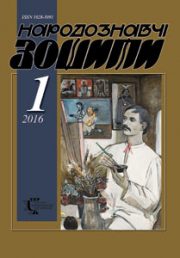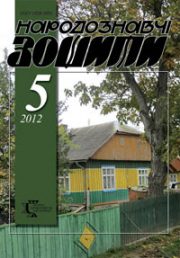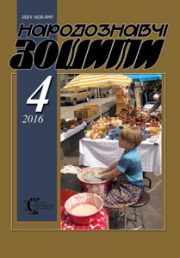The Ethnology Notebooks. 2020. № 3 (153), 714—722
UDK [94:070.48:314.151.5(560=512.19:477.75)]”198/200″
DOI https://doi.org/10.15407/nz2020.03.714
Rustem ABLÂTIFOV
ORCID ID: https://orcid.org/0000-0002-3368-7203
Master in Public Administration, PhD candidate,
Ivan Franko National University of Lviv,
Department of Middle Ages and Byzantine Studies,
1, Universitetska Street, Lviv, 79000, Ukraine
e-mail: abu-bakr@ukr.net
Abstract. The history of the Qırımlı formerly deported nation’s return from the former exile’s places to their historical Motherland — Crimea in the late 80’s — early 2000’s had been surveyed by many Ukrainian and foreign historians and political scientists. However, the question of a contribution and influence of the modern Turkey’s Crimean diaspora to the Qırımlı’s repatriation process, the revival of their culture, language and national education is leaved still out of consideration by researchers. Therefore, this is the topicality of this article. To show the transformation of socio-political thought in the Turkey’s Qırımlı diaspora to support the Qırımlı nation’s rights and freedoms during the period of their mass repatriation from the former exile’s places to their historical Motherland in the late 80’s — early 2000’s exemplified by the diasporic historical and philosophical journal Emel and its impact to change the national consciousness of the Turkish Qırımlı is the aim of this article.
The study subject is the Emel journal publications that had been published during the research period. This edition holds a specific place among the diaspora print media and it is a peculiar phenomenon in Turkey. In addition to the method of the content analysis of the journal’s publications, interviews with Turkish Qırımlı diaspora’s public figures and activists, both those directly involved in the journal’s activity and representatives of the Crimean national and cultural associations in Turkey, were also used as sources for this study. An attention is also paid to the impact of the journal to the social mobilization of Qırımlı communities in Turkey and a change in the cultural self-identification among the Turkish Crimean diaspora from «Turks of the Crimean origin» to the conscious determination of themselves as the Qırımlı diaspora of Turkey during the period of the late 1980s to the early 2000s.
Conclusion. Based on the study of Emel publications, oral recollections of the known public figures and activists of the Qırımlı diaspora, academic papers of Turkish researchers, an analysis is made of how under the influence of several external and internal factors, of socio-political thought among the Qırımlı diaspora transformed, the cultural self-identification of the Turkish Qırımlı changed among the diaspora, how a modern organized Turkish diaspora of the Qırımlı appeared from scattered communities.
Keywords: Qırımlı, Qırımlı diaspora, Emel journal, socio-political opinion, Crimea, Turkey, repatriation.
Received 20.06.2020
REFERENCES
Kulchytskyi, S. (2018). Struggle of the Crimean Tatars for return to the historical Motherland. Ukrainian historical journal, 2, 75—109 [in Ukrainian].
Safran, W. (1991). Diasporas in Modern Societies: Myths of Homeland and Return. Diaspora: A Journal of Transnational Studies, 1, 83—99. Retrieved from: http://europeofdiasporas.eu/sites/default/files/posts/files/3.%20Safran%20Diasporas%20in%20Modern%20Society.pdf (Last accessed: 26.07.2019).
Williams, B.G. (2001). The Crimean Tatars: The Diaspora Experience and the Forging of a Nation (P. 520). Leiden; Brill.
Kahraman, A. (2014). The Crimean Tatar National Movement in the publications of inner and outer diaspora: Lenin Bayragэ, Emel and Dergi. (Master’s Thesis). METU. Retrieved from: http://etd.lib.metu.edu.tr/upload/12617563/index.pdf (Last accessed: 15.07.2019).
Karpat, K. (1985). Ottoman Population 1830—1914. Demographic and Social Characteristics (P. 242). University of Madison-Wisconsin.
Aydın, F.T. (2012). Comparative Cases in Long-Distance Nationalism: Explaining Émigré , Exile, Diaspora and Transnational Movements of the Crimean Tatars. (Thesis for a Doctor of Philosophy in Political Science). University of Toronto. Retrieved from: https://tspace.library.utoronto.ca/bitstream/1807/67253/1/Aydin_Filiz_T_201211_PhD_thesis.pdf (Last accessed: 21.11.2018).
Eren. N., & Allwourth, E. (Ed.). (1998). Crimean Tatar communities abroad. In Tatars of Crimea. Return to the Homeland. Duke University Press (P. 323—351). Durham and London.
Chronicle. The Istanbul branch of the Association of Culture and Mutual Aid of the Crimean Turks: oficial page. Retrieved from: http://istanbulkirim.org/hakkimizda/tarihce/ (Last accessed: 16.04.2019) [in Turkish].
Toprak, F. (2013). Perception of Homeland Among Crimean Tatar Diaspor Living in Turkey as Reflected on the Diaspora Journal Emel. (Master’s Thesis). METU. Retrieved from: http://ansamblperegrinus.pl/uploads/artykuly/perception_of_homeland_among_crimean_tatar_diaspora_living_in_turkey_feyza_toprak.pdf (Last accessed: 16.11.2018).
Kirieiev, N.G. (2007). History of Turkey. XX century. Moscow: Kraft+ [in Russian].
About the journal Emel. The Foundation on Research and Examination of Turkic Culture: official page. Retrieved from: http://emelvakfi.org/emel-dergisi-hakkinda/ (Last accessed: 16.04.2018) [in Turkish].
(1960). In Reappearing. Emel, 1, 4 [in Turkish].
Ülküsal, M. (1975). OSCE Conference. Emel, 90, 1—8 [in Turkish].
Lessons of Chernobyl (1986). Emel, 155, 25 [in Turkish].
Çelebi Ç. (1994). From Sungurlu: I do not know my village. Emel, 204, 29 [in Turkish].
(1989). Emel, 175, 11—12 [in Turkish].
(1990). Appeal of the Crimean Tatar National Movement to the Russians and Ukrainians, which live in Crimea. Emel, 176, 41—42 [in Turkish].
(1991). Representation of the Crimean Tatar National Majlis in a conference of the Foundation on Research Study. Emel, 187, 41 [in Turkish].
(1991). Charitable campaign «Return our homes» continues. Emel, 189, 41—49 [in Turkish].
(1991). Decision on Representation of the Crimean Tatar National Majlis in Turkey. Emel, 187, 26 [in Turkish].
Karatay, Z. (1992). Visit of the Chairman of the Crimean Tatar National Majlis and a delegation of the Majlis to Turkey. Emel, 188, 1—32 [in Turkish].






